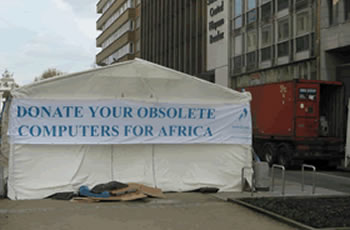South Cluster : vision, mission and expertise
Founded in 2003 and registered in 2004 as a Belgian non-profit orgnanisation, South Cluster AISBL work towards improving education in Africa through giving access to learning crucial IT skills in schools. We not only collect, check and ship the computers to Africa, but ensure through solid partnerships with African governments and local organisations that maintenance, training and replacement are taken care of and lead to a sustainable development of IT skills.
We have declared war on poverty and underdevelopment in Africa.
Education is the mother of the battle
Education is fundamental for just, peaceful, adaptable societies without poverty, and none of the development goals can be achieved without education. We have the conviction that education is a right, a foundation and prerequisite for sustainable development. An innovative society prepares its people not only to embrace and adapt to change but also to manage and influence it. The French revolutionary Danton said more than two centuries ago, "After bread, education." Education is the most basic necessity after those that are vital to life itself--food, clothing, and shelter. It is education that lifts people out of the state of chronic poverty in which they are constantly struggling to fulfil basic needs such as these.
The direct link between poverty and lack of educational opportunities has been demonstrated many times over. As Lyndon Johnson said during the War on Poverty in the 1960s, "Poverty has many roots, but the tap root is ignorance."
Education is also fundamental for democracy and liberty. Several great statesmen have recognized this importance. John Adams noted that "Liberty cannot be preserved without general knowledge among the people," and John F. Kennedy echoed that sentiment when he said, "Liberty without learning is always in peril, and learning without liberty is always in vain." The connection was perhaps best summed up by political commentator Walter Lippman, who had this to say: "No amount of charters, direct primaries, or short ballots will make a democracy out of an illiterate people."
Education in Africa
As stated in the Tony Blair’s Commission For Africa report, Education systems in Africa suffer a lack of relevant curricula. These Education systems are often based on inherited curriculum content that is limited to conventional academic subjects. Little weight tends to be given to teaching values or skills appropriate to a future society with the ability to compete in a changing global economy or cope with the current HIV pandemic. These are required if the quality of education is to be raised and completion rates improved.
Improving employability includes critical income-earning skills such as vocational, entrepreneurial, agricultural and computer skills as well as creative and analytical skills to provide flexible competencies to match changing market demands. But educational content is not just about delivering economic advancement: the rights and responsibilities of citizenship should also be taught. So should values of inclusion and challenges to stigma and discrimination. Conflict resolution and reconciliation techniques should be taught in education programmes
Curricula should be designed with regional histories, cultures and languages in mind. The main goal of Education in Africa should be to show African youth the way to sustainable development and tell them the truth about how the world works, about environment, globalisation, about the changes, about means and ways to develop.
South Cluster works to enhance Education in Africa, to lead it to take up these new challenges. In practice, South Cluster works to:
- Inform the general public to bring about a greater awareness of the new challenges of Education system in Africa. We intend to carry out that by publications, organization or participation to conferences, debates, forums that concern closely or by far Education in Africa.
- Improve/transform the school curricula in Africa by:
- The introduction of computer courses into the secondary schools and local associations in charge of education,
- Assistance to the development and introduction of new courses into the school syllabus, more relevant to development, globalisation, Environment, Citizenship, the relationship between Africa and the rest of the world.
Our expertise since 2003
The first container was shipped to Cameroon in February 2003. And the first Computer Room was inaugurated in March in a school in Ebolowa, Southern Province. Since then, the project has been extended to 5 African countries. Our expertise has been steadily improving. For all our projects, we pay special attention to the following points.
Local infrastructure, Security, Maintenance
Setting up a project requires the fullfilment of conditions regarding the local infrastructure, maintenance, and security, to assure the project continuity.
Facilitating formalities
In order to facilitate administrative and customs formalities, we negotiate and find agreements at the highest level in each country. We have thus signed conventions with the benefiting countries.
Involvement of all stakeholders
All South Cluster projects are generally distinguished by the full involvement and participation of all key stakeholders in particular the village elders, chiefs, mayors, governors, and parents that are becoming partners and patrons of their local school. This creates a high acceptance and success rate, which the upcoming projects will not only build on, but increase and enhance.
Monitoring and follow-up
During the execution of our projects, the needs, the possibilities and the challenges are constantly evaluated, in collaboration with the local partners.
Network of equipment donors
South Cluster has developed a donor-to-receiver flow of hardware in an environmentally friendly manner. This requires a welfare cost conscious move of freight taking into account economic and political structures, while keeping both a coherent and comparable approach. We continue to widen this network of equipment donors, which counts more than 200 corporations, including International Institutions as The Council of Europe and the European Investment Bank.

 NL
NL  FR
FR  EN
EN 